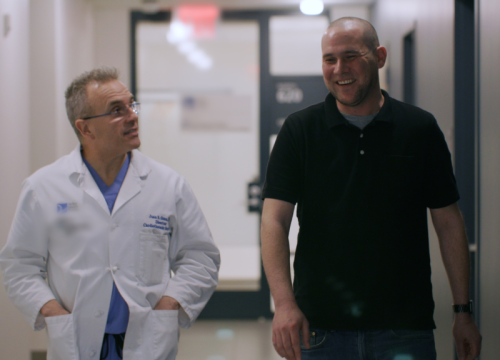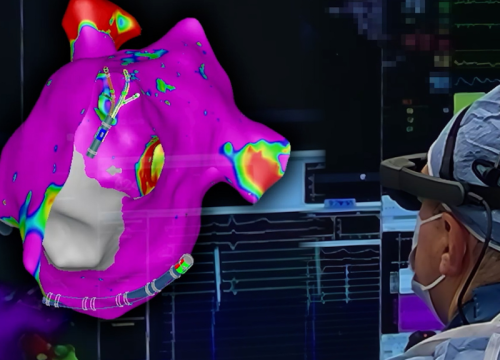Cervical cancer is a type of gynecologic cancer. It occurs when cancerous cells grow on your cervix (the small, muscular organ that connects the vagina and uterus).
If your recent Pap smear found cervical dysplasia (precancerous cells on your cervix) or you’ve already been diagnosed with cervical cancer, Valley can help.
We offer treatments to prevent precancerous cells from becoming cancerous. And our gynecologic cancer team has experience treating even the most advanced cases of cervical cancer, as well as vulvar and vaginal cancers.
We aim to provide the expert medical and surgical care you need — plus the emotional and spiritual support you deserve.
Cervical Cancer Symptoms
In its earliest stages, cervical cancer usually doesn’t cause symptoms. When symptoms appear, they may include:
- Unusually long or heavy menstrual periods
- Vaginal bleeding between periods or after sex
- Vaginal bleeding after menopause
- Watery or bloody vaginal discharge that may have a foul odor
If cancer spreads beyond the cervix, you may also experience one or more of the following:
- Abdominal or pelvic pain
- Blood in your urine
- Diarrhea
- Fatigue
- Painful urination
- Rectal bleeding
- Unexplained weight loss
Cervical Cancer Causes
Certain factors may increase your risk of developing cervical cancer. These include long-term use of birth control pills and having a family history of cervical cancer.
However, scientists now know that a sexually transmitted infection called human papillomavirus (HPV) causes most cases of cervical cancer.
Not everyone who’s had HPV will get cancer. Often, the immune system fights the infection and clears it from the body.
But for others, having HPV causes cells in some regions of the body — such as the cervix — to change. These changes can eventually cause the cells to become cancerous. This is why Valley recommends the HPV vaccine for all qualified patients.
WATCH: Valley physicians explain the link between HPV and gynecological cancer. They also describe how the HPV vaccine protects against HPV infection (and subsequent HPV-related cancers).
Cervical Cancer Treatment at Valley
There isn’t a one-size-fits-all treatment for cervical cancer. You may need a combination of treatments.
For this reason, Valley takes a team approach to cervical cancer care. Multiple experts — including gynecologic oncologists, radiation oncologists and gynecologic surgeons — weigh in on the best way to treat you.
Together, they’ll create a treatment plan that addresses your medical needs and personal goals. For example, they’ll consider:
- Your age
- Your overall health
- Whether your cancer has spread beyond your cervix
- Whether you want to have children in the future
Your Cervical Cancer Treatment Options
Your treatment plan may include one or more of the following:
- Surgery: We offer more than one type of surgery, ranging from procedures to treat early-stage cancer to significant operations for advanced cancer. These include cone biopsy for early-stage cancer (we remove the tissue containing cancerous cells from your cervix) and hysterectomy (we remove your uterus).
- Chemotherapy: We may use these cancer-fighting medicines to shrink your tumor before surgery or kill any lingering cancer cells after surgery.
- Radiation therapy: We offer the latest radiation treatments, including options that kill cancer cells in just a few visits. Our areas of expertise include external beam radiation therapy (a machine sends radiation beams into your body) and brachytherapy (we place radioactive material inside your body).
- Immunotherapy: These advanced medicines help your immune system identify and attack cancer cells.
- Targeted therapy: These medicines target specific proteins that help cancer cells grow and spread.
Valley also treats cervical dysplasia (precancerous cells on the cervix). For example, we can remove these cells using a minimally invasive technique called loop electrosurgical excision procedure (LEEP).
Why Choose Valley for Cervical Cancer Care?
- An extra dose of compassion: At Valley, we know cancer affects every aspect of your life. When you turn to us for cervical cancer care, you get more than just the latest medicines and procedures. You also get a medical partner who will treat you like family. We’re here to listen to your concerns, connect you with support services and prepare you for the journey ahead.
- Fertility preservation: If you’re concerned about your ability to have children after undergoing cervical cancer treatment, talk to your care team about fertility preservation. We offer options — including egg freezing and embryo freezing — that can improve your ability to get pregnant in the future. We also provide gestational surrogacy services for patients who are unable to carry a pregnancy (for example, because they’ve had a hysterectomy).
- Access to promising new treatments: Through our partnership with the Mount Sinai Health System, Valley patients with cervical cancer have access to clinical trials and, if necessary, advanced cancer treatments.

















